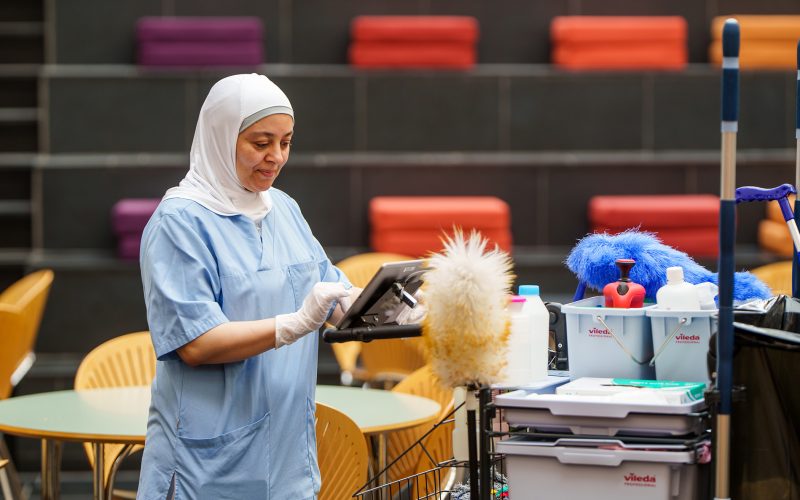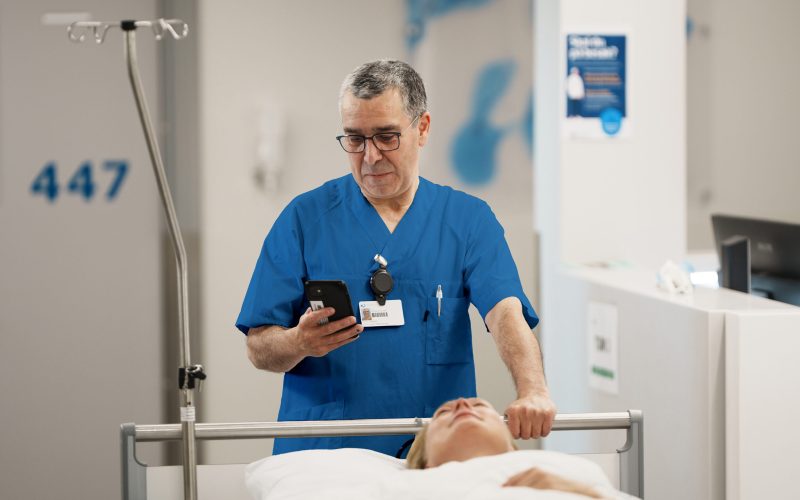Enabling smarter coordination of support services in daily hospital operations
The challenge
Support services like cleaning, catering, and porter teams are essential to smooth hospital operations. Yet they’re often managed through fragmented workflows, paper requests, or ad hoc phone calls. This slows down patient transfers, causes delays in discharge, and adds to the administrative burden for clinical staff.
When these services operate without real-time information or integrated communication tools, bottlenecks appear: empty beds waiting to be cleaned, patients delayed in transport, or meals wasted due to outdated orders. These issues affect patient flow, staff efficiency, and ultimately, quality of care.
The approach
By embedding support service coordination into the hospital’s digital ecosystem, hospitals can better connect clinical teams with cleaning staff, porters, and catering. Tasks are generated, updated, and tracked directly through shared digital boards and mobile apps — reducing delays, streamlining routines, and making it easier to match resources with real-time needs.
This creates a more agile and responsive hospital environment, where everyone sees the same picture and can act on it without manual follow-up.
Related case studies
15-17 hours saved
per shift per day on coordination and manual routines at Haraldsplass Diaconal Hospital >
Missed orderly tasks
down by 2-7%
Fewer unnecessary porter trips and improved task flow at Østfold Hospital >
Bed turnaround time
reduced by 50%
by coordinating cleaning and discharge, corresponding to €130,000 in annual operational savings at Østfold Hospital >
How it works in practice
Cleaning and disinfection tasks
- Cleaning requests are entered directly into digital whiteboards in the wards and instantly visible on the cleaning team’s tablets and phones.
- Staff can view daily room cleaning, infection control requirements, and pending discharges — allowing them to plan their work based on actual patient flow.
- Once the cleaning is complete, staff confirm it digitally, and the room status is updated automatically.
- Managers can track waiting times and task durations — not to monitor individuals, but to identify systemic delays and adjust cleaning schedules accordingly.
Catering and meal planning
- Nurses place patient food orders through the digital board as little as two hours before mealtime — accounting for dietary needs, fasting status, or nutrition requirements.
- Buffet hosts in the kitchen receive the order directly on their system, reducing the risk of errors or outdated requests.
- This flexibility supports patient-specific care while also helping to reduce food waste and unnecessary meal preparation.
Porter service and transport
- Requests for patient transport are made directly through the digital board, reducing the number of clicks and paperwork.
- The porter team receives clear, structured tasks that ensure faster, more accurate response — avoiding delays or repeated trips.
- The system has replaced manual forms with a simpler, digital process that saves time and reduces error.
Results seen in practice
Hospitals that use this approach report:
15-17 hours saved per shift per day on coordination and manual routines
Improved accuracy and traceability leading to enhanced patient safety
Missed orderly tasks down by 2-7%
Bed turnaround time reduced by 50% by coordinating cleaning and discharge


Why it matters
Support services are often invisible until they become the reason for a delay. By giving these teams access to real-time operational data and integrating their tasks into the same system used by clinical staff, hospitals can unlock hidden efficiency, reduce unnecessary work, and improve care continuity.
When everyone is working from the same information — and has the tools to act on it — the result is a hospital that flows better, with less friction between teams.
Want to learn how to utilise available resources more effectively?
Want to improve how porters, cleaners, and other support teams work together? Our digital tools help streamline daily operations, reduce manual follow-ups, and ensure tasks are assigned, delegated and completed efficiently.
If you’re looking to boost hospital-wide coordination, we’d love to show you how.


